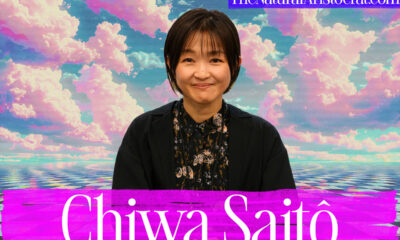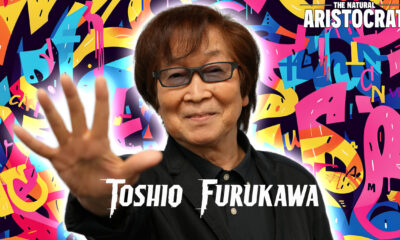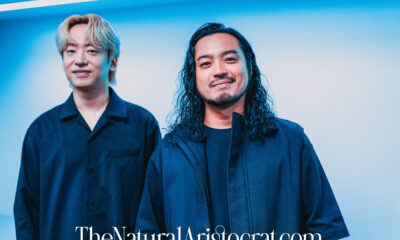Published
5 years agoon
It was a great honor for The Natural Aristocrat to interview Katharina Kubrick, daughter of Stanley Kubrick, about her late father’s lifetime of contributions to cinema at the Astoria, Queens based Museum of the Moving Image. New York City’s MoMI will be home of the Envisioning 2001: Stanley Kubrick’s Space Odyssey Exhibition open now until July 19, 2020. Rarely does The Natural Aristocrat get sentimental but to be personally connected to Stanley Kubrick’s family and history in any fashion is truly surreal.
Katharina Kubrick discussed film as an art form, why her father’s work connects seamlessly with generation after generation, her favorite part of MoMI’s Envisioning 2001 Exhibit, Stanley as a family man, and questions film aficionados may be wondering about. Including: Would Stanley have embraced The Irishman’s de-aging technology? What ultimately made Stanley decide to hand directing of A.I. Artificial Intelligence to friend Steven Spielberg? The details of the threats made during production of Barry Lyndon, and the tragedy that made Stanley abandon flying.
Watch the full interview with Katharina Kubrick above or read the transcript below:
The Natural Aristocrat [Nir Regev]: You mentioned earlier at the ‘Envisioning 2001’ presentation that younger fans have come up to you and said, ‘this film is G.O.A.T!’
Katharina Kubrick: (laughs) I’ve only just learned that phrase!
It really makes Stanley’s work timeless. What does it mean to you to have multiple generations always returning to these films no matter how many decades pass?
You know, why do people still listen to Bach? Why do people still look at Van Gogh’s paintings? I think if the art, whatever it is, whatever form it takes, whether it’s a painting or music or film is honest and speaks to people, then it will last. I think a lot of people think that film is a sort of a one view consumer project.
I mean obviously a lot of films are. But if you’ve put a lot of heart and soul, thought and effort, and money into making a movie, to my way of thinking, you should be wanting to make a film that lasts. Why would you make something that you just think, ‘Oh, people are going to forget it by the time they’ve walked out of the cinema’?
Film is one of the great art forms, it involves story and music and acting and design. And it is so all encompassing of all the arts. You have a lot of different artistic disciplines that come into making a film. It’s new, in terms of world art but I think good films make a great contribution to the quality of our lives. But I would say that, wouldn’t I? (smiles)
Were you were heavily impacted by your mother Christiane in pursuing art as well?
Yes, my mother is an artist. She’s a very good painter and has a very good website, ChristianeKubrick.com. Stanley found her when he was in Germany making a film called Paths of Glory, and wanted an actress for the last scene. He was watching television and saw her in a play, called her agent, asked for an interview. And you know the rest as they say, is history.
She had been acting for a living but didn’t really want to be an actress, she always wanted to be an artist. Being with Stanley meant that she didn’t have to act anymore and she could be a painter. So there were two artists living in the same environment and encouraging each other. They were a great team those two. (smiles)
I’ve noticed while listening to you earlier and in general that Stanley always wanted to make his work a family affair. He’d feature you and your sisters in film cameos, utilize family-made paintings and music. Essentially, want all of the family involved in some fashion.
I think if Stanley had his way we would all have worked in the film industry because as far as he was concerned… Why wouldn’t you want to work in the film industry? He was very pleased that I went into the art department and films and had my own career apart from working for him. My late sister Anya was an opera singer, so obviously the film business wasn’t for her. And then my youngest sister [Vivian Kubrick] made a documentary on The Shining.
So, he was very keen for us to be involved because he thought it was the best business to be in. He would involve us whenever he could. We were always together as a family. We always traveled everywhere together. Everything was based from home. And so we were all if not directly involved, we were all there and he would show us drawings or concepts or talk to us about ideas he had. “What do you think about this, and what you think about that?” We were always a team.
One of my favorite movies personally is Barry Lyndon. I’ve read that Stanley received threats for having British soldiers essentially on Irish soil?
No, they were Irish soldiers. Well, what we had is a British film crew and we were in Waterford (city in Ireland) and the soldiers were all Irish soldiers and a lot of the crew were also Irish. But the main film unit was British. We were renting a house and there was a cleaning lady and she said some guys came to clean the windows or paint the house. I can’t remember which way it was. And they said, ‘Oh you know, these people are not who they say they are. We know who these people are.’
There were difficult times in Ireland at the time. And then I think there was a phone call received and it was made very obvious that we needed to not be there anymore. That there was a potential threat against the crew, if not us directly.
I was actually not in Ireland, I was back in England at the time when it happened. They just had to hightail it out of there. Stanley said it’s just a movie, it’s not worth anybody getting hurt for. So he was very pragmatic from that point of view. They moved to England, the whole unit move to England. I went back on the picture and we all started looking for locations again, and we set up the production offices in Salisbury (city in Wiltshire, England).
I’ve always been curious about A.I. Artificial Intelligence, a film that Stanley started being interested in making all the way back in the 70s. From what I’ve read over the years, Stanley really wanted to make this film and it seemed stuck in development limbo. Eventually he asked Steven Spielberg if he would direct the picture.
Why did Stanley feel the technology was never quite good enough prior? I’ve read Jurassic Park had a considerable impact on Stanley decidedly pushing for Spielberg to direct, although Spielberg still wanted Stanley to direct the film. Would Stanley have directed the film after Eyes Wide Shut had he not passed?
No, there were certain sequences in A.I. that CGI hadn’t caught up to at that point. They weren’t very good at doing fur and water. Stanley was very impressed with Jurassic Park. When he approached Steven and said, “I really think you should direct this and I’ll produce,” Steven was surprised obviously. But then I think very encouraged and he didn’t give it back. Stanley was going to do it, after Eyes Wide Shut it was fully his intention to work on A.I.
He told me that he thought he would make it too dark and that it was more Steven’s subject matter. That the two of them would collaborate very successfully. They were really good friends and they talked about it a lot. I think it probably would have been a very good collaboration. I feel
I think they more or less agreed that Steven would direct it and Stanley would produce it. I’m very pleased that Steven made it.
How do you feel Stanley would have looked at the de-aging technology recently used in Martin Scorsese’s The Irishman?
I haven’t seen The Irishman but Stanley would have loved all the new technology for sure! I think he would have just been finding ways that he could incorporate all the new stuff into a new story. He never knew what film he was going to be making next. Stanley was a voracious reader and he said that finding a good story that he wanted to make and fallen in love with was the most difficult thing for him.
It took him years to decide what to make or to find a good story that would sustain him throughout the filmmaking process. Because you have to really love it and believe in it and trust in your instincts. And then you have to do all the research, which was part of the thing that he liked doing a great deal, was the research. It’s like he cut filmmaking into thirds first third was research, second third was filming it, and then the last third was editing. That was his favorite process of the whole thing, the editing.
Did you personally watch Doctor Sleep?
Yeah, I’ve seen it. Well, I haven’t seen it finished. I saw it a couple of months before it came out.
You mentioned earlier how much Stanley loved New York. I’ve read that after Stanley got his pilot license, he felt that commercial airlines weren’t safe and didn’t really like traveling by flying anymore. Do you feel the choice affected his life in any way?
He did have a pilot’s license and he flew a very small plane himself. What happened was that his good friend was killed in an air accident. Stanley, being his close friend was sent all his personal effects and I think it just freaked him out completely. He just couldn’t cope with it. He just didn’t fly, didn’t have to fly. We always went everywhere by ship.
What’s your favorite part of the ‘Envisioning 2001: Stanley Kubrick’s Space Odyssey’ Exhibit here at the Museum of the Moving Image?
I like seeing all the sketches and the the artwork, actually. It’s good fun. It’s very interesting to see the process, the way people’s minds work in getting to the final result. There’s lots to see!
Thanks Katharina!
Thank you!
Be sure to check out the full MoMI Envisioning 2001 Exhibit Press Presentation and The Natural Aristocrat’s tribute article to Barry Lyndon’s use of Handel’s ‘Sarabande’ as a prominent piece overlaying the film.
Follow Katharina Kubrick on Twitter and Instagram. Learn more about the Museum of Moving Image’s ‘Envisioning 2001: Stanley Kubrick’s Space Odyssey’ Exhibit at this link and book a visit today!
Nir Regev is the founder of The Natural Aristocrat. You can directly contact him at [email protected] for coverage consideration, interview opportunities, or general comments.



Exclusive Photos: Singer Rina Maejima performing in Brooklyn


Exclusive Photos: Sayaka Yamamoto at ‘Japan Night’ NYC Concert


Chef Masaharu Morimoto to be Grand Marshal of Japan Parade


‘Pretty Guardian Sailor Moon’ live tour coming to NYC & NJ


Chiwa Saitô Interview: ‘My son plays video games I’m in, doesn’t know it’s me’


Toshio Furukawa Video Interview: Piccolo voice actor on career
The Natural Aristocrat



